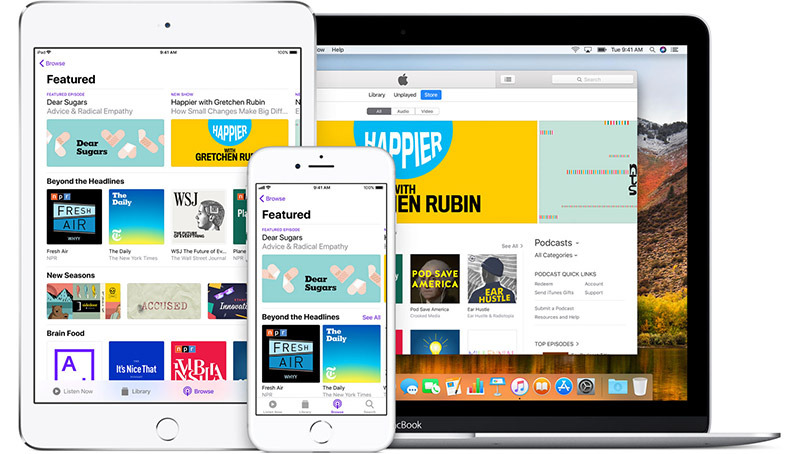According to a report on Thursday, Apple employees had a hand in the development of National Public Radio's recently launched Remote Audio Data system (RAD), an analytics platform that enables content creators to gauge listener statistics. Importantly, RAD provides engagement information on money-making advertisements.
A major player in the podcasting world, NPR has much to gain from metrics provided by RAD. Beyond content polling, the system provides valuable data on whether users are listening to embedded ads on which NPR, and many other podcasters, rely as a source of revenue.
Currently, ad sales are generally calculated by gross download numbers, a decidedly crude process that stands in stark contrast to data quantification and sharing techniques championed by Facebook and Google. By providing granular data on listener habits, RAD aims to shed light on the intrinsic value of podcasts both for podcasters and advertisers.
As noted by The Verge, however, the success of RAD depends largely on Apple, which maintains the world's premiere podcasting outlet in Apple Podcasts. Citing numbers from Anchor, a podcasting creation tool, the report says Apple's platform hosts more than half of all podcast listens, while Spotify is the second-largest single repository with 19 percent of all listens. The remainder is cobbled together from smaller outlets.
Neither Apple nor Spotify have announced support for RAD, though NPR told The Verge that Apple employees "offered their feedback" on the system. What feedback Apple provided, and whether NPR took action on the input, is unknown.
As it stands, RAD inserts tags into podcasts, enabling an analytics engine to track when a listener hits a specific point in the show. Presumably, tags can be used to monitor when a user reaches an ad and, more importantly, whether said ad is played in full or skipped. RAD sends this information to the podcaster, who can use it to market their show to advertisers.
Whether Apple intends to support RAD is unknown. User privacy will likely be a major sticking point for the company, though NPR says the system does not send identifiable information to podcasters and advertisers. Still, Apple device users are accustomed to a high degree of anonymity afforded by the tech giant's consumer-first ethos, and a third-party system that tracks listening habits runs counter to expected protections.
In addition, Apple is testing its own podcast analytics service that provides granular data like when users stop listening to a given episode. Other metrics tracked include number of downloads, total hours listened, time per device, average consumption, devices subscribed and top countries.
 Mikey Campbell
Mikey Campbell







-m.jpg)






 Malcolm Owen
Malcolm Owen

 Charles Martin
Charles Martin


 Mike Wuerthele
Mike Wuerthele
 Christine McKee
Christine McKee



-m.jpg)






5 Comments
This is RAD thing is just silly. The only people who care about this, are the people at NPR (who don't seem to get the medium).
And, while they have a few popular podcasts, I'm not sure they qualify as "major players" in the grand-scheme (ie: if we're talking about listenership and downloads, they are tiny fraction of the podcasting world).
There is no incentive for anyone to join their little party, as the only one to gain would be those wanting to implement an outdated advertising system. For those who do, the metrics in podcasting are already better than traditional media. Invasive metrics aren't going to fly in the podcasting world.
Best case, they implement in their player and talk a few other players into incorporating it. In that case, we're talking a few percent of listers at best.
If you want to hear a good commentary on this from a true industry expert, Rob Walch (of Libsyn) talked about it on the their last episode:
https://thefeed.libsyn.com/134-google-podcasts-fail-and-rad-thoughts
(1:07:40 in)
Also, FYI... Libsyn has better metrics than Anchor (seriously, Anchor???).
Apple's podcast app accounts for over 60%.
Spotify is slowly heading towards 10%.
Overcast (which Marco said wasn't going do to this) is 3.3%.
NPRs app doesn't make the over 1% category to get listed, and I'm guessing it's hundredths of a percent, if that.
Also, here's Marco's take on it:
https://twitter.com/marcoarment/status/1072559878735101952
And, yes, Apple offers some form of analytics like this for podcasts that are played with their Podcast app, though I'm pretty sure properly anonymized. While you only get a segment of the audience, it gives the kind of feedback metrics a podcast creator might need to fine-tune things in their podcast. So, this is really all about advertising, which as I said above, is a broken model to most podcasters anyway. Mechanisms for funding that actually work, include value-for-value, donation, sponsorship, influencer marketing, etc.
Honestly, the only way this gets traction is if advertisers shift to requiring it in order to pay for ad reads.